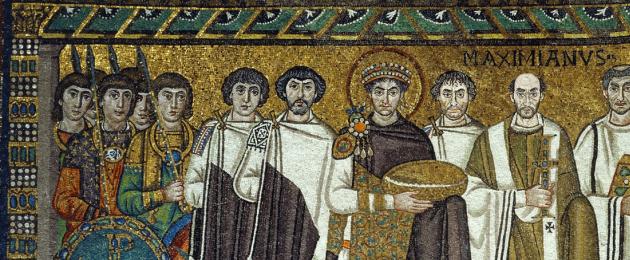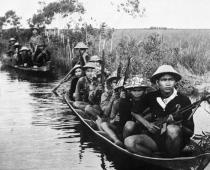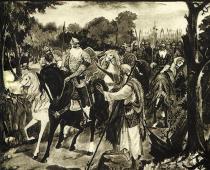The 6th century saw the reign of Emperor Justinian (527 - 565), who decided to restore the Roman Empire within its former borders. The emperor was surrounded by talented people, among whom Flavius Belisarius stood out for his talents.
Youth
Belisarius was born at the beginning of the 6th century in the north of the empire, in the province of Moesia (present-day Bulgaria). In his youth, the future commander showed himself excellently during his service in the palace guard, gained experience on the Danube and in 530 became the commander of the Byzantine troops during the war with the Sassanids. He won a brilliant victory at the Battle of Dar, against twice the Persian forces, using active defense techniques, fortification art, and a dismembered battle formation.

In 532, Belisarius was urgently recalled to Constantinople, where Nick's rebellion broke out. Thanks to the competent actions of the commander, Justinian managed to maintain power - during the coronation of the leader of the insurgents, government troops suddenly burst into the hippodrome and perpetrated a massacre. After strengthening his power, Justinian matured the idea of sending an expedition to Africa under the command of Belisarius, where the vandals created a whole pirate state that terrorized the Mediterranean with their raids. The formal reason for the war was the overthrow of Justinian's friend, the Vandal king Gilderic.
In 533, Belisarius landed in Africa with only 15,000 infantry and cavalry. The new king of the Vandals, Gelimer, decided to defeat the Romans (as the Byzantines called themselves) on the way to Carthage, the largest city in Vandal Africa. Dividing his troops into parts, he planned to simultaneously attack Belisarius from three sides, but due to the inconsistency of actions, the vandals were defeated in turn. Belisarius occupied Carthage, but the further conquest of Africa stretched out for another 20 years and ended with the fall of the Vandal kingdom.

Italian Wars
Two years later, Belisarius landed in Sicily to recapture Italy from the Ostrogoths, who founded their kingdom there. Justinian directed a distracting army along the coast of the Adriatic Sea, while Belisarius delivered the main blow from the south. After the capture of Sicily, the commander crossed over to Italy and cunningly captured Naples - a detachment of Byzantines entered the city through an abandoned aqueduct, at night the troops of Belisarius attacked the city from two sides and captured it. While the Ostrogoth king Vitigis was at war with the Franks, Belisarius occupied Rome. The Ostrogoths gathered a large army and laid siege to the city. The forces of Belisarius numbered no more than 10 thousand, so the townspeople were attracted to the defense of the walls of Rome 19 km long. For more than a year, Rome held out thanks to the courage of the defenders, the skillful tactics of deep raids (used by Belisarius in order to deprive the Ostrogoths of communication with their base - Ravenna) and the weak engineering skills of the besiegers themselves.
Vitigis retreated, but the Ostrogoths retained an overwhelming superiority in manpower and resources. However, now, not only the attitude of the population and superiority in the organization of the army played into the hands of Belisarius, but also the halo of invincibility. Vitigis made peace with the Franks and at the cost of territorial concessions and tributes made an alliance with them against Belisarius. But the help of the Franks did not help either. Vitigis capitulated, inviting Belisarius to become king of the Ostrogoths and the new emperor of the West. Belisarius wisely refused, but rumors of this reached Justinian, who had long heard from envious people about Belisarius's unreliability. The commander was recalled to Constantinople, under the pretext of a threat from the east.

Eastern War of Belisarius
During the time that Belisarius was on the road, the threat turned from potential to real - the Sassanian shahinshah Khosrov devastated the rich areas of the empire and, agreeing to a large tribute, returned to Iran. But as soon as Belisarius arrived in Constantinople, Justinian broke the peace and sent a general east. Khosrow invaded Colchis, and Belisarius, instead of going to meet the Persians, invaded Persia and the shahinshah was forced to return.
The following year, the Persians decided to invade Palestine and gathered a large army. Belisarius resorted to trickery. When Khosrov sent an embassy to scout the Byzantine forces, the commander put on a real "show": he selected the best soldiers and sent them forward along the route of the embassy, imitating a guard detachment of a huge army. The warriors dispersed and constantly moved after the ambassador. Belisarius himself was very self-confident. The ambassador, returning to the Shahinshah, reported on what a large army Justinian had gathered against the Persians and Khosrov decided to retreat.
The last hike and disgrace
The emperor feared the growing fame of Belisarius, and sent him with a small army to Italy, where the new king of the Ostrogoths, Totila, conquered one city after another. Belisarius managed to recapture Rome, but did not have sufficient strength to re-capture Italy. In 548 he returned to Constantinople without reaching his goal. After returning to the capital, Belisarius remained out of work, then, during the Slavic invasion, he managed to repel the attack of the Bulgarians. Soon he fell into disgrace with the emperor and lost all estates and titles. It is to this period of Belisarius's life that Jacques-Louis David's painting "Belisarius begs for alms" is dedicated. In the end, the commander was acquitted by the emperor, although he died in obscurity.

Flavius Belisarius is one of the most prominent military leaders in history, whose campaigns are still being analyzed by military theorists today. The loyalty of the commander, who went through not only fire and water, but also copper pipes, makes him respectful of the personality of Belisarius himself. His talents helped Justinian return Africa and Italy to the empire, although soon the western possessions of the empire were reduced to several cities, and the economy was upset by numerous wars.
- In contact with 0
- Google+ 0
- OK 0
- Facebook 0








